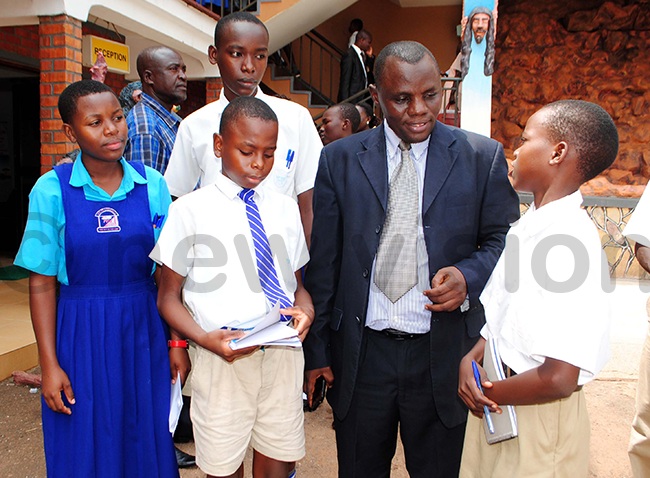Children call for National Dialogue
The children made the appeal during a consultative meeting with UHRC officials in Kampala on how best children's rights can best be safeguarded.
Group pictures Pupils from different school during the Regional Dissemination meeting of special report on the assessment of the compatibility of the National legislation with the Convention on the rights of the child at Nob View Hotel on February 28, 2019.photo by Mary Kansiime
Children have asked the Uganda Human Rights Commission (UHRC) to ensure that their grievances form part of the National Dialogue agenda.
The children made the appeal during a consultative meeting with UHRC officials in Kampala on how best children's rights can best be safeguarded.
The children protested grave violations of their rights, through child labour, torture, sex slavery, being denied the right to education, health, unlawful detentions, among others.
President Yoweri Museveni in December, last year launched the National Dialogue process at State House Entebbe.
He inaugurated the Uganda National Dialogue coordinating team, highlighting patriotism, pan Africanism, socio-economic development, and democracy, as the key issues he needed to be emphasized during the dialogue.
However, different stakeholders including opposition political parties such as Forum for Democratic Change (FDC), Democratic Party (DP) have since distanced themselves from the dialogue insisting that the ground is not leveled for fruitful deliberations.

Regional Human Rights Officer at Uganda Human Rights Commission Willy Agirembabazi (second right) interacting with from Racheal Kyasiimmire (left) from Kampala Capital City Authority Primary School, Enock Shyaka (back row) from Shimoni Demonstration School, Jonah Mukisa (second left)from Shimoni Demonstration School and George Idiawo (right) from Kiswa Primary School during the Regional Dissemination meeting of special report on the assessment of the compatibility of the National legislation with the Convention on the rights of the child at Nob View Hotel on February 28, 2019. Photo by Mary Kansiime
The national dialogue coordinated by the office of the Prime Minister will work with the Group of Six that includes the Interreligious Council of Uganda, Elders Forum of Uganda, Women Situation Room, Citizens Coalition for Electoral Democracy, National Consultative Forum, and Inter-party Organization for Dialogue.
Rachael Kyasiimire, aged 13, from KCCA primary school in Kamwokya, says children's rights should be discussed during the National Dialogue for possible solutions on the violations of children's rights.
"I want the National Dialogue to discuss punitive disciplinary measures against a father who commits incest with his child," George Idiawo of Kiswa Primary School, P.7 class said.
Willy Agirembabazi, the Regional Human Rights Officer Central region, said they are collecting children's views for consideration during the National Dialogue.
Agirembabazi added that UHRC with support from UNICEF is also conducting the exercise to examine the compatibility of the national legal framework on the rights of children in Uganda to ensure that it complies with international human rights standards, specifically the Convention on the Rights of the Child (CRC).
Uganda ratified the Convention on the Rights of the Child in 1990 as well as its attendant two Optional Protocols later on.
"Since then, measures have been taken to ensure that our laws, administrative structures, and the law enforcement mechanisms are in conformity with the CRC and its attendant protocols.
These, for instance, include provisions in municipal law as the recently amended Children Act," he said.
Other important treaties relevant to children's rights that have been ratified by Uganda include the Convention on the Elimination of All Forms of Discrimination against Women (CEDAW) and the Convention on the Rights of Persons with Disabilities (CRPD).
According to UHRC, in spite of the progress made with regard to the implementation of the CRC, the daily reality is thousands of children in the country are in sharp contrast to these commitments and objectives.
"For instance, many children still live in poverty, they face major threats to survival, and they lack opportunities for quality education as well as proper health and social care.
They are also victims of the worst forms of child labour, sexual exploitation, abuse and other various forms of violence, many of them are often trafficked, forced into early marriages and have to endure harmful traditional practices," Agirembabazi said.